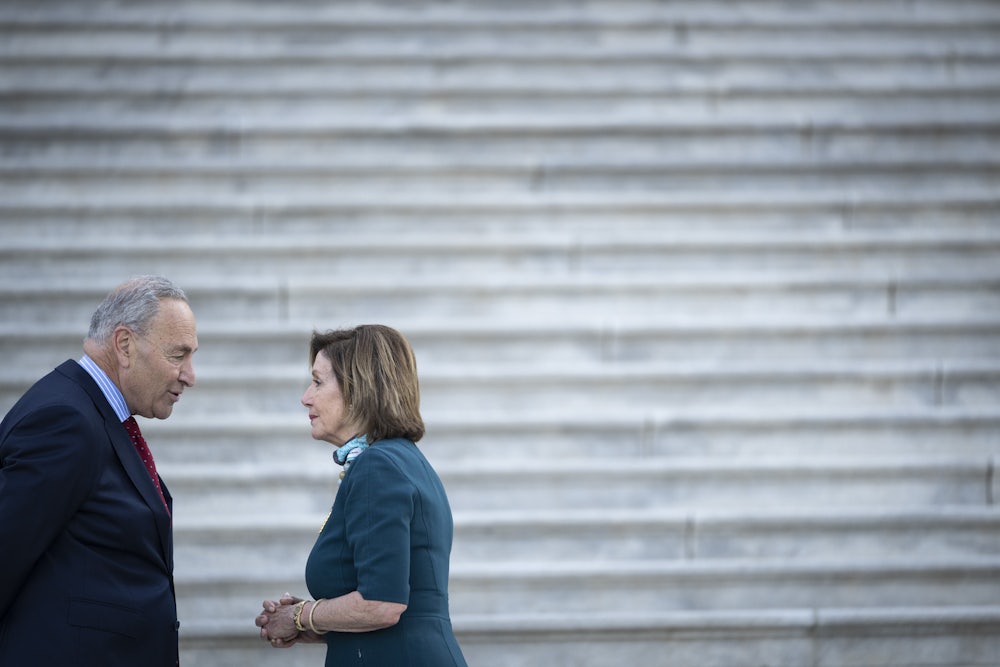Lawmakers may wish that someone would wake them up when September ends, but unfortunately, there is simply too much for Congress to do next month—and too little time to accomplish it.
Like students procrastinating on their biggest projects, congressional Democrats have a limited period to address a number of priorities—not to mention funding the government and raising the debt ceiling—before running up against a wall of deadlines. As is so often the case, the great obstacle is the cruel and relentless march of time, moving inexorably toward the beginning of October. It doesn’t help that the congressional schedule currently has lawmakers out of Washington for the majority of September. The Senate is expected to return to Capitol Hill on September 13; the House is scheduled to come back on September 20.
With the midterm elections already looming, and Republicans structurally favored to retake at least one house of Congress—if not both—this may be the last opportunity for Democrats to make good on their promises to voters.
The House still has to vote on the bipartisan infrastructure bill—so painstakingly and painfully crafted in the Senate—that passed earlier this month. After several days of showdowns between a group of House moderates and Democratic leadership over the legislative timetable, the House passed a rule on Tuesday that requires the chamber to vote on the infrastructure bill by September 27. The provisions in that bill would go into effect on October 1.
Committees in both chambers must also craft a budget reconciliation bill by mid-September. The House passed the budget resolution laying out instructions for writing the reconciliation bill on Tuesday. The bill has to be sent through reconciliation, an arduous and complicated process that allows legislation to be approved with a simple majority. This would allow Democrats to shepherd it through the Senate without any Republican votes. However, all 50 Democrats would need to support the final product, leaving no room for error.
The reconciliation bill is expected to include a wish list of measures aimed at making progress on liberal priorities such as expanding Medicare, extending the child tax credit, implementing paid leave, reforming immigration, and combating climate change. Democratic leadership has settled on $3.5 trillion as an acceptable number for this bill, claiming that it will be fully subsidized through offsets such as raising corporate tax rates.
But that $3.5 trillion price tag is controversial among members at both ideological ends of the Democratic party. Some moderates in both chambers have raised concerns about voting in favor of a bill with such high costs, while progressives argue that the number isn’t high enough to fully address all Democratic priorities. Although the majority in the House isn’t quite as narrow as the 50-50 split in the Senate, it’s close—Speaker Nancy Pelosi can afford to lose only three votes on such a bill. In a concession to moderates, Pelosi committed on Tuesday to voting only on a reconciliation bill that can pass in the Senate.
It’s also unclear whether the House will vote on reconciliation next month. Passing the bill requires unity in a Democratic caucus that is often, and famously, in disarray. Moderate Democrats who say they are unwilling to vote for the reconciliation bill until the bipartisan bill is passed will butt heads with progressives saying the opposite. In a statement on Tuesday, the Congressional Progressive Caucus said, “We will only vote for the infrastructure bill after passing the reconciliation bill.” Progressives are concerned that, if the vote on the bipartisan bill comes first, moderates will balk and not vote for the (much larger) reconciliation bill.
Several progressive House members said on Tuesday that they wanted to see the two bills passed at the same time, which could mean on the same day. “They have to be together,” Representative Cori Bush said.
If the reconciliation bill isn’t ready by the end of the month, these members may not vote for the bipartisan bill by the September 27 deadline.
“If we are able to get the reconciliation budget done by then, then we will follow through with that. If we’re not, I expect that there will be delays in order for both,” Representative Ilhan Omar told reporters. Representative Rashida Tlaib echoed this sentiment, saying Tuesday that Democratic leadership “can put all these deadlines all they want, but they’ve got to bring all this along.”
Meanwhile, a group of 10 moderate Democrats said in a statement Tuesday that they viewed the two bills as “fully delinked”—meaning that there could be a standoff between the two factions of the party if both bills aren’t ready by September 27.
Congressman Hakeem Jeffries, the chair of the House Democratic Caucus, attempted to allay concerns, telling reporters in a press conference on Tuesday that the caucus is a “big” and “diverse family.” But, regardless of what Jeffries or Vin Diesel in the Fast & Furious movies want us to believe, families can also be dysfunctional and divided.
As if the brewing infrastructure brouhaha was not enough, Congress must also vote to raise the debt ceiling, which was suspended in 2019 and reinstated in August at around $28.5 trillion. Without congressional action, the Treasury may run out of money to fund the government in the fall and touch off a possible credit crisis, although it’s not likely that the worst-case scenario would play out before September 30.
Republicans have said that they are uninterested in raising the debt ceiling. But Democrats are not including a provision for doing so in budget reconciliation, which would allow them to raise the ceiling without any Republican votes. This is because it’s a sticky political situation: The reconciliation bill is already costing upward of $3 trillion. If they raise the debt ceiling by $10 trillion, the bill would then cost more than $13 trillion, which would be even more unpalatable for moderates.
As of now, it seems likely that Democrats will bring legislation to raise the debt ceiling and essentially dare Republicans to vote against it.
Democratic Representative John Yarmuth, the chair of the Budget Committee, told reporters on Tuesday that he ultimately believed Republicans would be unwilling to repeat the debt ceiling crisis of 2011, which saw the U.S.’s credit rating downgraded by Standard & Poor’s for the first time, and back down.
“Republicans lost themselves a lot of political credibility when they allowed the debt ceiling to expire and the government to shut down,” Yarmuth said. “I don’t think they’re going to do that again.” But Democrats are making a risky bet by assuming 10 Republicans will cave and agree to raise the debt ceiling, an outcome that is far from assured.
And oh yeah, lest we forget, Congress also has to accomplish its lone constitutionally mandated job: keep the government running. The fiscal year ends on September 30. So Congress either has to pass all of the massive appropriations bills before that time or, far more likely, pass a continuing resolution extending the deadline to later in the year. Congress may also want to take action to address the ongoing crisis in Afghanistan, perhaps by authorizing more special immigrant visas.
Several key programs expire on September 30, including the National Flood Insurance Program authorization and increased benefits under the Supplemental Nutrition Assistance Program. Congress may also wish to extend the eviction moratorium set to expire on October 3, which progressives in particular see as a vital pandemic relief measure.
It’s not as if lawmakers will be completely idle between now and their return to Washington—committees will be crafting the budget reconciliation bill and approving different appropriations measures. But the critical final votes can’t happen without both chambers in session.
Jeffries dismissed concerns about the impending deadlines in a press conference. “This is a battle-tested group, and I’m confident that there’s no challenge we can’t overcome,” Jeffries said in response to a question from The New Republic.
But despite the tyranny of these self-imposed deadlines, there’s a good chance that all or most of these issues get shoved until December. If past is prologue, it’s certainly likely that the problem of funding the government will be kicked to Christmas. The reconciliation bill, large and unwieldy as it is likely to be, also may not be finished in time. But if there’s one thing the modern Congress is good at, it’s pushing up deadlines—and then extending them when they can’t get the work done in time.








